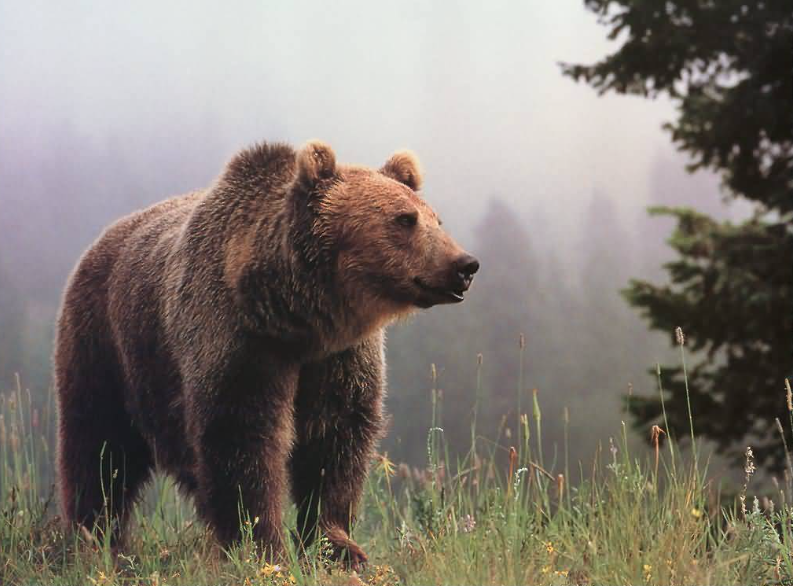By Peninsula Daily News news services
EDITOR’S NOTE: This story updated with information about previous grizzly attacks. Video from ABC News: http://abcnews.go.com/topics/news/yellowstone-national-park.htm?mediatype=Video
YELLOWSTONE NATIONAL PARK, Mont. — The body of a hiker has been found in Yellowstone National Park after he was mauled to death by a grizzly bear and her cub.
His body was found partially consumed and covered, the park said.
Rangers said tracks found at the scene show that an adult female grizzly and at least one cub were likely involved in the attack. They are hunting for the bears.
The park said the man was “a seasoned hiker” who had worked and lived in Yellowstone for five seasons.
“While the exact cause of death has not been determined, investigators have identified what appear to be defensive wounds on the victim’s forearms,” Yellowstone said in a statement Saturday.
His body was found by a park ranger on Friday afternoon in a popular off-trail area less than a mile from Elephant Back Loop Trail near Lake Village.
The victim will not be named until all his relatives are informed, but he is believed to be from Montana and a long-term seasonal employee of Medcor, the company that operates three urgent-care clinics in Yellowstone, CNN reported.
He was reported missing on Friday morning when he did not report for work.
Authorities will not release the official cause of death until an autopsy is carried out on Monday.
Attacks are rare
There are between 674 and 839 grizzly bears in Yellowstone although attacks on humans are rare.
Bear traps were set in the area on Friday evening, and the area has been closed until further notice.
If any bears are trapped and identified as having been involved in the attack, they will be euthanized.
Yellowstone National Park Superintendent Dan Wenk said: “‘We may not be able to conclusively determine the circumstances of this bear attack, but we will not risk public safety.
“‘We are deeply saddened by this tragedy and our hearts go out to the family and friends of the victim as they work to cope with the loss of someone who loved Yellowstone so very much.”
Previous bear attacks
Bear attacks in Yellowstone are rare, with an average of one attack occurring per year. Since 1980, 43 people have been injured by bears. Prior to Friday’s discovery, only seven people had been killed by bears in the park since it opened in 1872.
The most recent Yellowstone deaths occurred in 2011, when a man hiking by himself was killed by a grizzly bear on the Mary Mountain Trail in Hayden Valley, and a day hiker in a party of two was killed by an adult female grizzly bear with two cubs on the Wapiti Lake Trail in Hayden Valley.
That was also the year a female grizzly with cubs attacked three people at the Soda Butte Campground near Cooke City, just outside the park, killing and consuming a man. The bear was captured and killed.
Last year, a man was killed by a grizzly or black bear in Togwotee Pass in the Jackson Hole Valley in Wyoming.
There were four human-bear conflicts in 2014 in Yellowstone, according to a report compiled by the Interagency Grizzly Bear Study Team. All involved bears damaging property while attempting to obtain food.
The number of conflicts often varies from year to year because of factors like the availability of natural bear foods, grizzly population numbers, park visitors and park staffing.
On signs pasted across Yellowstone, hikers are discouraged from hiking alone and warned to carry bear spray, make noise to avoid surprise encounters and store food out of bears’ reach. If a bear does charge, people are advised not to run but stand their ground and if necessary, drop into a prone position.
The vast majority of bear attacks occur when people surprise a bear, especially if it has cubs nearby.
Grizzlies numbers in the Greater Yellowstone Ecosystem have increased from a low of about 200 in the 1980s to more than 700. As population increased, a warming climate has contributed to the demise of whitebark pine trees in Yellowstone.
Their seeds are a staple of bears’ diets. Lake trout have also thinned numbers of cutthroat trout, another major food source.
However, predatory bear attacks remain extremely rare.

